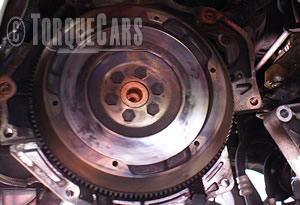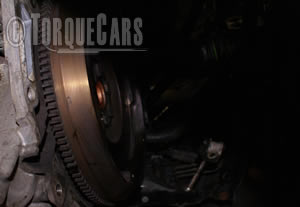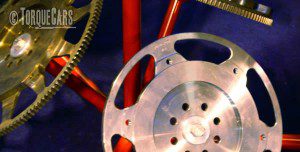Guide to Performance Flywheels.
"Thank you for reading my guide to flywheel weight reduction"
With the general focus on tuning cars being the engine and its handling, we sometimes need reminding to look at other components around the drivetrain and in this article, we'll look at lighter performance flywheels.
So questions we need to ask are what does a flywheel do? How do flywheels work? What are the advantages and disadvantages of fitting lighter weight flywheel.
What does a flywheel do?
 If you remember those toy cars you used to have where you revved them up, let them go and they zoomed off you'll have experienced a flywheel.
If you remember those toy cars you used to have where you revved them up, let them go and they zoomed off you'll have experienced a flywheel.
The flywheel sits between the engine and the gearbox and spins with the engine rotations, it helps keep the engine spinning smoothly.
A flywheel effectively stores the kinetic energy and stabilises the engines rotation, causing drops or increases in speed to happen more slowly which is great for cruising, or smoothing out slight blips from a lumpy engine but doesn't help rapid engine speed changes.
Why do cars have flywheels?
A reciprocating piston engine is inherently full of vibration and the flywheel helps to keep everything rotating. It also resists declines in engine speed typical when you hit a hill or lift off the throttle so makes driving the car a lot easier.
If you didn't have a flywheel it is unlikely your car would tickover and would just stall out, you would also be losing speed on every hill and incline you encounter.
So let's look at the pros and cons of flywheels and what upgrade options there are and the drawbacks and benefits of each of these.
See our video on this topic for a discussion on flywheels and how to improve them.
Drawbacks from light flywheels
It takes effort to change the flywheels speed, so drops or increases in RPM happen more slowly.
If you reduce the weight in the flywheel it will reduce the work the engine has to do allowing it to rev more freely.
We all know that weight is a destroyer of performance so a lighter flywheel also makes the car lighter but treat this as a small plus it's not the main reason for fitting one.
Pros and cons of lightweight flywheels
You’ll notice the revs in a highly tuned Motorsport engine increases and decreases revs much faster than in a standard engine this is because the flywheel is lighter and the rotational energy of the engine is not inhibited or maintained.
This is actually also a big downside to a lighter flywheel is that engine momentum or inertial spin is reduced. This will become apparent on a hill as the engine tends to bog down.
Whereas on a heavy flywheel the momentum in the engine is maintained and more resistant to bogging down.
What is the best flywheel upgrade for your car?
An extremely light flywheel should only be used in a Motorsport environment, but weight can be varied by degrees so there is an optimum point where you get best of both worlds.
If you heel and toe gear change with braking and rev match a lighter flywheel can greatly improve your driving style.
Various weights of flywheel are available allowing you to get the best torque/free revving capabilities. 
Different grades of lighter flywheels are available for different applications, and for street cars you don't want to go too light or your tick over may suffer.
We suggest you drop into the TorqueCars car forums to discuss your required application with our members who've generally tried most tuning mods by now.
Can you drill your existing flywheel to reduce weight?
Don't EVER TRY to make your own light weight flywheel by drilling holes in it, this is a precision component and the slightest imbalance can cause major issues.
Even the OEM flywheels are precision balanced. If there was a wobble in the flywheel it would have disastrous consequences on the engine and gearbox and substantially reduces your red line.
The faster the RPM the greater the effects of a wobble will be. A flywheel that snaps will send a buzz saw of metal through the car potentially causing injury to driver or passenger.
Off the shelf lightened flywheels are carefully balanced and made of various alloys blended for strength and lightness - some even come with holes and gaps like an alloy wheel.
When to replace a flywheel.
If you are replacing a clutch you may just as well get the flywheel sorted while you are at it as most cars require removal of the flywheel to get to the clutch housing and assembly.
If your flywheel is very heavy and the car holds onto it's revs for too long, for example making gear shifts much slower as you have to wait for the revs to match your transmission RPM then a lighter flywheel is the way to go.
They are not ideal if you have fitted an aggressive cam profile, as the engine will be more lumpy and will stall more easily if the flywheel weight is reduced.
So what's a dual mass flywheel and can these be swapped for lighter single mass units?
We've spoken so far about solid flywheels or single mass flywheels. A solid rotating mass but as with most things in the performance car world there is another version.
These are the dual Mass flywheels. These have a couple of surfaces which are connected via a spring.
The spring acts to dampen the rotational differences in acceleration and deceleration, it softens those pulses you get from an engine and is particularly effective in V5 engines where the engine is slightly off balance and in most turbo diesel engines.
They help to smooth out the power taking up vibration from the engine and reducing the risk of reversion in 4 cylinder engines and smoothing out diesel engines.
A DMF can be a pain when they start to go wrong with unusual vibrations and noises.
We note that some of our members are replacing them with solid and lighter flywheels but we suggest your read our guide on DMF to SMF conversions first, in many diesel engines you'll rue the day you decides to drop the dual mass and replace it with a solid unit.
If you are serious about lightening bits and pieces to get a free revving engine try a carbon fibre drive shaft.
These will rotationally flex more that their metal counterparts and reduce strain on the engine. If a metal drive shaft breaks you will soon know about it as parts are thrown through the car!
A carbon fibre one is stronger but if it does break it will 'broom' into 'harmless' fibres and little damage will be done to the car.
For more tips and advice on car tuning and modification we suggest you join our very friendly modified car forum and get some specific tips and advice for your car and swap ideas with our enthusiasts.
Please Check out my YouTube channel, we're regularly adding new content...
PLEASE HELP: I NEED YOUR DONATIONS TO COVER THE COSTS OF RUNNING THIS SITE AND KEEP IT RUNNING. I do not charge you to access this website and it saves most TorqueCars readers $100's each year - but we are NON PROFIT and not even covering our costs. To keep us running PLEASE Donate here
If you liked this page please share it with your friends, drop a link to it in your favourite forum or use the bookmarking options to save it to your social media profile.
Feedback - What do You Think?
Please use our forums if you wish to ask a tuning question, and please note we do not sell parts or services, we are just an online magazine.
Help us improve, leave a suggestion or tip
Please watch this video and subscribe to my YouTube channel.
4 Responses to “Lightening the flywheel”


 Click to accept YouTube Cookies & Play.
Click to accept YouTube Cookies & Play.
You need to take any weight off the outside of the FW and not around the bolts to the crank for the best results.
If you go too light you may have trouble taking off and stall till you get used to it
Have decided not to lighten my FW after speaking to a successful drag racer he told me that he had tried a number of them and now uses a slightly heavier than stock FW
Before you start attacking the flywheel on your car, we have always found a few old parts from scrap yards to teach apprentices the best way to go about getting it right for the application of the engine. The lightest of the flywheels are found on dragster and strip cars, then rally car engines need to be able to supply power in short bursts then circuit racing, a good idea for the removal of metal is far from the bolt ring, friction plate and ring gear for the starter motor
The advice you were given was from a very good drag race engines experience as the high power engines are able to put the flywheel under so much pressure that they can disintegrate